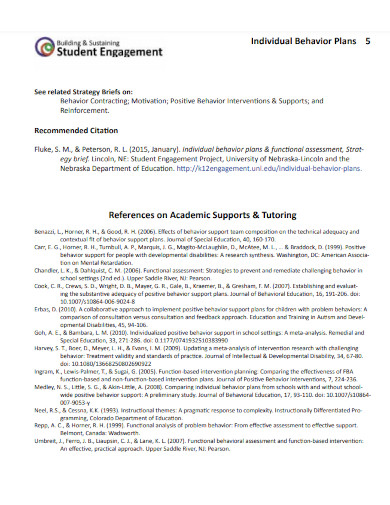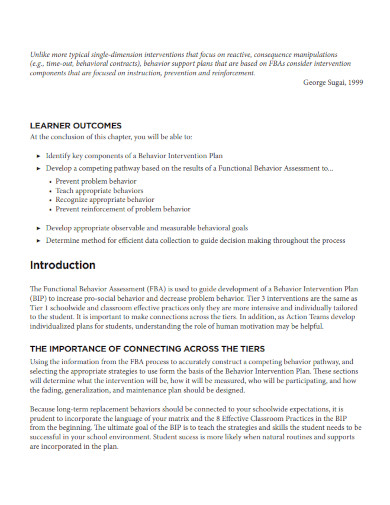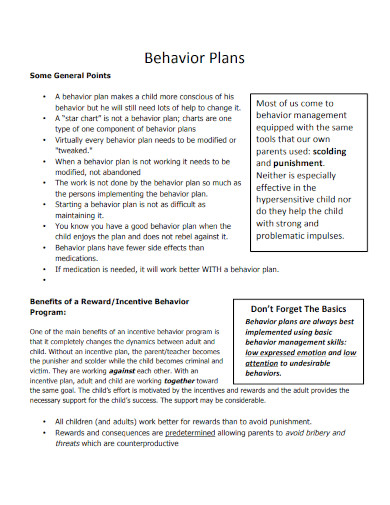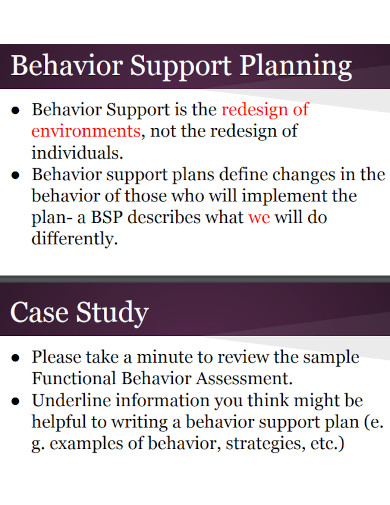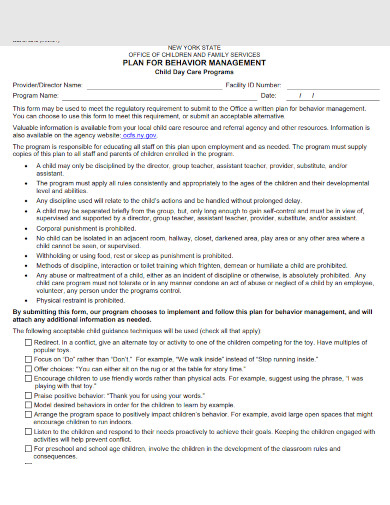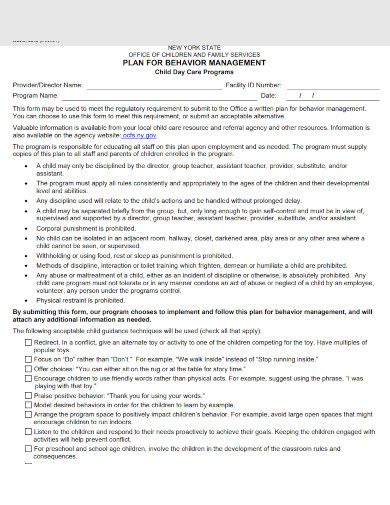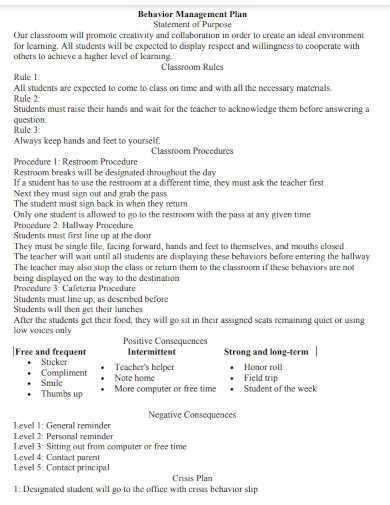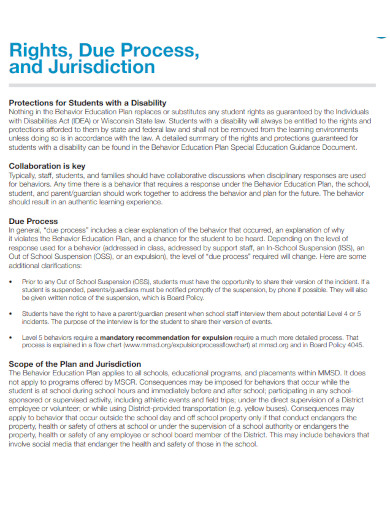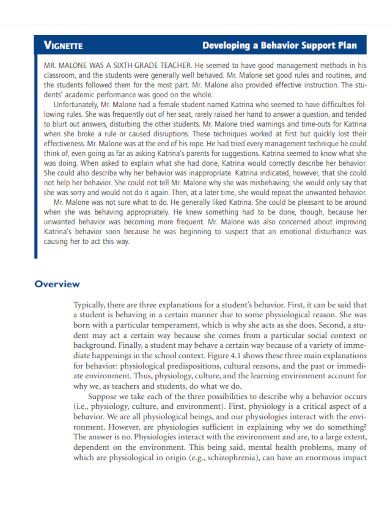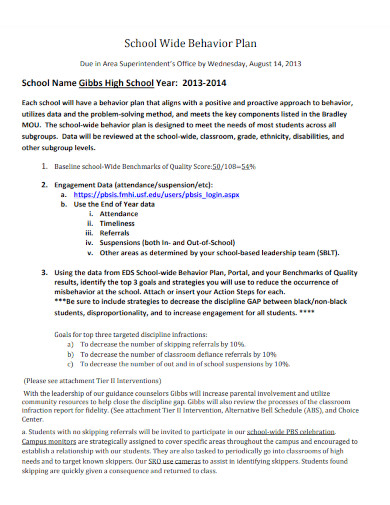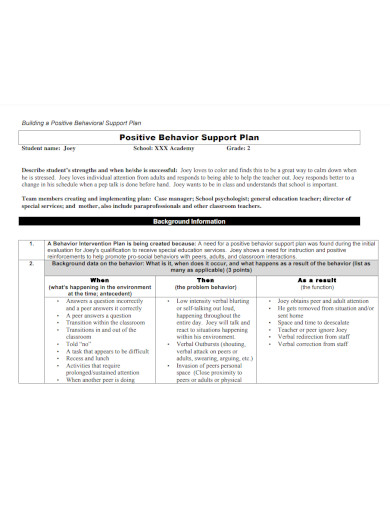One of the most significant obstacles many children must overcome to improve their academic career performance is dealing with behavioral changes and issues. When children need help with concentrating at school, it is quite likely that they will not finish their assignments on time. The majority of the time, students and youngsters that are struggling with behavioral issues are the ones who cause disruptions in their respective classrooms. Because of this, kids will continue to get into problems as long as they attend school. As a result, preschool teachers or elementary teachers are responsible for supporting pupils who exhibit behaviors like these by preparing a behavior plan template for behavior modification.
10+ Behavior Plan Samples
1. Individual Behavior Plan
2. Behavior Intervention Plan
3. Behavior Partnership Plan
4. Behavior Support Plans
5. Behavior Managment Plan
6. Lesson Plan to Address Behavior
7. Behavior Management Plan Statement of Purpose
8. Behavior Education Plan Elementary
9. Functional Behavior Support Plans
10. School Wide Behavior Plan
11. Positive Behavior Support Plan
What Is a Behavior Plan?
A written document that teaches about appropriate behavior and its rewards is called a behavior plan. The number of pages included in this plan can range anywhere from one to many, depending on the particulars of the behavior incident. You need to have an understanding that the primary purpose of a behavioral plan is to avoid the use of punishment whenever possible while still achieving the personal goal of reducing or even eliminating undesirable behaviors in children. For instance, the BIP examples consist of three basic components: the problem statement, the solutions to assist, and the behavioral problems.
How To Make a Behavior Plan?
The intervention component of the behavior plan consists of techniques and support, which are included in the plan. They are often formal and are put into effect for a predetermined amount of time. In addition, the group in charge of the plan is responsible for ensuring that the strategies are implemented effectively. As a result, you need to be familiar with the processes involved in producing one.
Step 1- Add Necessary Info
To get started, provide the student or child’s name and other fundamental information. The name of the school, the student’s grade level, and the current date are all included here. There are occasions when an individual’s address, student number, date of birth, and emergency contact information are included in a behavioral plan. Include the instructor’s name or the person in charge of writing the child observation report somewhere in the document.
Step 2- Assess The Problem
Determine the problematic conduct, and provide as much specific information as possible. It should be able to be measured, and it should be observable. It ought to be nothing more than a summary. And the more particular you can be, the better. When describing the issue, be sure to mention the child’s name. One example of a student’s problematic behavior pattern is her habitual use of inappropriate language for her age group.
Step 3- Establish a Goal
Establishing a goal is an essential first step for every worthwhile endeavor. What is the primary aim of the behavior intervention strategy that you have developed? Which of the following would be more desirable: the outcome or the behavior? Is it possible to substitute a better, more socially acceptable conduct for the undesirable one? Be sure to refer back to the problem statement at all times. The aim should address the problematic pattern of conduct. It needs to be detailed and, if possible, time-bound as well.
Step 4- Identify Interventions
Develop crystal clear and specific techniques to discourage undesirable conduct while simultaneously encouraging favorable behavior. What strategies can be applied to replace habits in a way that will lead to achieving certain goals or desired outcomes? Provide details regarding the timing and procedure of putting these initiatives into action. For instance, praising and rewarding a child’s behavior as a kind of positive reinforcement would be appropriate if the youngster demonstrates significant improvements in their behavior or if their advancement is a step in the right direction.
What exactly is a “behavior plan” at the school where I go?
An intervention from a teacher, guidance counselor, or administrator is part of a behavioral plan at school. This plan is designed for students whose behavior is causing concern or causing them to have difficulty.
What components make up an intervention plan for a behavior?
In most cases, the Student Information, the Target Behavior, the Goals, and Desired Outcome, Teaching Strategies for the Replacement Behavior, Methods for Tracking Progress, etc. are all components that are included in a Behavior Intervention Plan.
How long does a plan to intervene in behavior typically last?
Ideally, a behavior intervention plan should be established within a manageable timeframe. There are some behavior plans that must be followed for a minimum of two weeks. Others are only effective for a few months.
Even while a behavior intervention plan might not be successful every time, it assists the child and the adults who are directly accountable for the child in recognizing triggers and, in some cases, finding the underlying reasons for the issue. It is also a tool that can be used to gain a deeper understanding of the child and the circumstance. When it comes to managing classroom conduct and activities, a behavior plan is still helpful, albeit to a lesser level. You can start personalizing your plan right now by downloading any sample plans shown above.
Related Posts
FREE 9+ 30-Day Marketing Plan Samples in PDF | MS Word | Apple Pages | Google Docs
FREE 3+ Sales Team Action Plan Samples in PDF | MS Word | Apple Pages | Google Docs
Marketing Plan For Small Business Samples
FREE 7+ Fashion Business Plan Samples in PDF
FREE 10+ Sprint Planning Samples In MS Word | Google Docs | PDF
FREE 10+ Wedding Planning Samples in MS Word | Apple Pages | Powerpoint | PDF
FREE 9+ Monthly Study Planner Samples in PSD | Illustrator | InDesign | PDF
FREE 9+ Sample Curriculum Planning Templates in PDF | MS Word
FREE 10+ Teacher Development Plan Samples in MS Word | Google Docs | Apple Pages | PDF
FREE 10+ Basketball Practice Plan Samples in PDF
FREE 12+ School Business Plan Samples in PDF | MS Word | Apple Pages | Google Docs
FREE 7+ Client Strategic Plan Samples in PDF | MS Word
FREE 11+ Trucking Business Plan Templates in PDF | MS Word | Google Docs | Pages
FREE 7+ Small Hotel Business Plan Samples PDF | MS Word | Apple Pages | Google Docs
FREE 14+ Bakery Business Plans in MS Word | PDF | Google Docs | Pages

